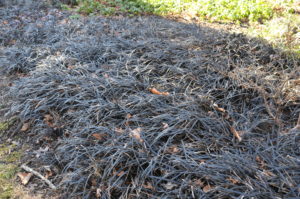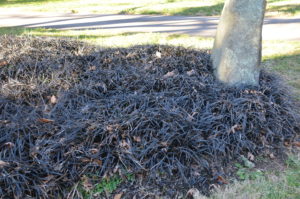Black mondo grass or black lilyturf (Ophiopogon planiscapus) is sold as a number of cultivars – ‘Arabicus’, ‘Black Dragon’, ‘Nigrescens’, or ‘Ebony Knight’. This stoloniferous grass-like perennial belongs to the lily family (Liliaceae) (USDA hardiness zones 6-9). Its blackish-purple foliage (3/16 inch wide leaf blades) forms lush arching clumps. For the patient gardener, know that black mondo starts off slowly. Compared to other mondo grasses, this black form grows shorter @ 8 -12 inches in height.
Indigenous to Japan, black mondo typically grows in slow spreading clumps with arching, slowly-spreading clumps. The dark purple foliage appears almost black in most sites. In southern climates, black mondo is often planted under the shade of trees, because leaf blade color will fade under intense sunlight. White, bell-shaped flowers (up to 1/4 inch long), with pink to lilac tints, bloom in summer. Dark purple globular berries mature in fall.
Black mondo grows best in humus rich, slightly acidic, moist, well-drained, soils and in partial to full shade. Mondo prefers consistent, evenly moist soils. Although not reliably winter hardy in USDA Zone 5, many northern gardeners have been successful growing it in a protected area. Plant foliage is evergreen in Southern winter climates. Black foliage color is best in cool sunny locales of zones 6 and 7 and in light shady spots in zones 8-9.
In the landscape black mondo makes for a great edging plant or utilize it as a filler plant in containers. Its dark grassy foliage makes a great accent feature. As garden edging space plants 4-5 inches apart and they should fill within 3-4 years. Feed with a slow release fertilizer such as Osmocote™ or Nutricote™ in early spring. Rake away fallen leaves from nearby trees and shrubs in the fall so mondo grass can continue to grow through the winter months. Irrigate a new planting the first season and during prolong summer dry spell.



 Posted in
Posted in 
